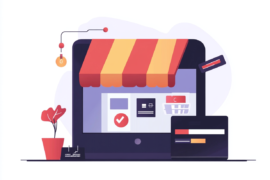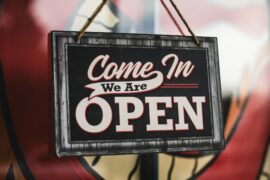This article may contain references to products or services from one or more of our advertisers or partners. We may receive compensation when you click on links to those products or services. Nonetheless, our opinions are our own.
The information presented in this article is accurate to the best of our knowledge at the time of publication. However, information is subject to change, and no guarantees are made about the continued accuracy or completeness of this content after its publication date.

Updated by Albert Fang
Getting a start in the business world presents a lot of opportunity for many people, regardless of the industry they set foot in. Opportunities which often enable an increased income, an improved skillset as well as the chance to strengthen self-discipline and work hard on something that you enjoy.
However, there are a myriad of challenges and a few rather common struggles that come from running a business, which often links back to your own personal finances.
In this article, we will take a look at a few of the most common ways that a business can be impacted and also affect your personal finances, and what protections and processes you can put in place to minimise any potential damage to your business’s success.
You should always do your best to stay on top of things such as debts, both good and bad, as well as financial commitments that come from your lifestyle. These can all impact your everyday life, and also have a lasting effect on things such as your credit scores, for example.
All of that out of the way, let’s get into how personal finances can impact your business.
Lenders Look to Credit Scores
One of the first things that you will notice when it comes to launching a business, especially if you need some sort of start-up investment amount, is that lenders are going to take a look into your own personal finances before approving or denying loans.
That means everything from personal liquidity, cash flow, income and even unpaid bills are going to impact your ability to get your business off the ground.
It is good to know that your personal credit scores can be adapted and improved over time, and with a commitment to improving these scores, you will be enhancing your ability to get a loan amount of your requirements.
Something to note is that even the smallest missed payments, such as $50 bills can impact these scores, and so we suggest that prior to launching a business you work to pay off as many outstanding debts and repair and recover your credit score where you can.
Credit Utilisation Information
A second significant way in which your personal finances can affect your business is through your utilisation of credit.
As you might already know, banks and lenders are going to majorly look into things such as your use of credit cards, and how often these cards are used – and whether there are a lot or just a few outstanding payments.
As a general rule, lenders are going to want to see that your utilisation of credit is at below 30 per cent.
With that in mind, a lot of new business owners are under the impression that personal and business finances are split down the middle, however, lenders don’t see them this way and thus take credit card use and debt into consideration before handing out loan amounts.
Personal Debts
In line with credit card debt, lenders are also going to take a deep dive into all of your personal debts, with their institution as well as banks.
It is key to keep in mind all of your debts as a total and how large these are. Lenders are going to combine all of these amounts into one to better determine your total borrowed amount, and if you have a considerable amount of debt, your lendable size is going to be reduced – even if you do make payments on time.
One way to use this to your advantage, however, is to work to pay off all of your payments on time as well as in larger amounts than required. If you do have a lot of debt, or require a lot of debt for your lifestyle or simply for your home, use this debt amount to allow your lenders to see how well you keep on top of payments.
As you’ll know, late payments or entirely missed payments paint a bad picture, and so be sure that you work against this.
Personal Finance Mistakes
Where a degree or training in the financial field majorly helps out here is in personal finance and the mitigation of common mistakes.
It is suggested that before anyone sets foot in the world of business that they undertake some form or formal training to ensure they’re making the right financial movements in both their personal lives and once a business gets up and running.
Diving into a course offered by Monarch, for example, will give students and graduates the ability to better navigate the complex world of finance and more easily make business decisions that result in profit and increased income, rather than potentially losing the business money or eventually resulting in bankruptcy.
One thing to keep a note of is that a lot of lenders will look favourably on applicants who have these types of degrees under their belt – and may even require these degrees for some types of loans.
Financial Habits Can Worry Suppliers
One of the more frequently overlooked impacts that personal finances can have on your endeavours in business is the scaring off of your suppliers.
Much like how banks and lenders will take a gander into your own personal finances before offering up a loan, suppliers for your business are going to do the same, which creates an issue if they find that your personal finances are anything less than perfect.
When it comes to finding suppliers for products, for example, you are going to find that these suppliers are less likely to want to work with your brand, and so you’re at risk of not having a specific product on offer for your customers.
As you would expect, this can be quite damaging given that you won’t be able to gain an edge over competitors without a wide range of tailored products.
That being said, there are a few other ways to get suppliers on board, and this can be through paying more for a product or service or even offering up the chance to pay larger down payments for products to offset the risk for said suppliers.
Personal Obligations can Swallow Business Success
Our final point is that your personal finances and obligations have the chance or can run the risk of enveloping your business’s success.
What this means is that you could see any profits or business growth being absorbed by debts, overdue bills or poor spending habits – all of which will leave you with less disposable income for your business, and leave you with less cash to reinvest back into your business’s growth for the long term.
All of the points above noted, there’s a good chance it is now clear that your business can be majorly affected by your own personal finances, spending habits and debts.
It is important to keep in mind that how you spend, what you owe and your own financial history can have, and often will have a major impact on what you can do in the future with regards to financial manoeuvrability.
As someone who runs their own business, or someone who is attempting to launch a brand, you should always do your best to keep your finances in the green and build a solid foundation upon which to build your business. Without a solid foundation, you run the risk of business failure.

Reviewed and edited by Albert Fang.
See a typo or want to suggest an edit/revision to the content? Use the contact us form to provide feedback.
At FangWallet, we value editorial integrity and open collaboration in curating quality content for readers to enjoy. Much appreciated for the assist.
Did you like our article and find it insightful? We encourage sharing the article link with family and friends to benefit as well - better yet, sharing on social media. Thank you for the support! 🍉
Article Title: How Your Personal Finances Can Impact Your Business
https://fangwallet.com/2021/03/18/how-your-personal-finances-can-impact-your-business/The FangWallet Promise
FangWallet is an editorially independent resource - founded on breaking down challenging financial concepts for anyone to understand since 2014. While we adhere to editorial integrity, note that this post may contain references to products from our partners.
The FangWallet promise is always to have your best interest in mind and be transparent and honest about the financial picture.
Become an Insider

Subscribe to get a free daily budget planner printable to help get your money on track!
Make passive money the right way. No spam.
Editorial Disclaimer: The editorial content on this page is not provided by any of the companies mentioned. The opinions expressed here are the author's alone.
The content of this website is for informational purposes only and does not represent investment advice, or an offer or solicitation to buy or sell any security, investment, or product. Investors are encouraged to do their own due diligence, and, if necessary, consult professional advising before making any investment decisions. Investing involves a high degree of risk, and financial losses may occur including the potential loss of principal.
Source Citation References:
+ Inspo































![How to Hire Fintech Software Developers [Cost & Factors] fintech software engineers](https://fangwallet.com/wp-content/uploads/2025/03/fintech-software-engineers-270x180.png)












